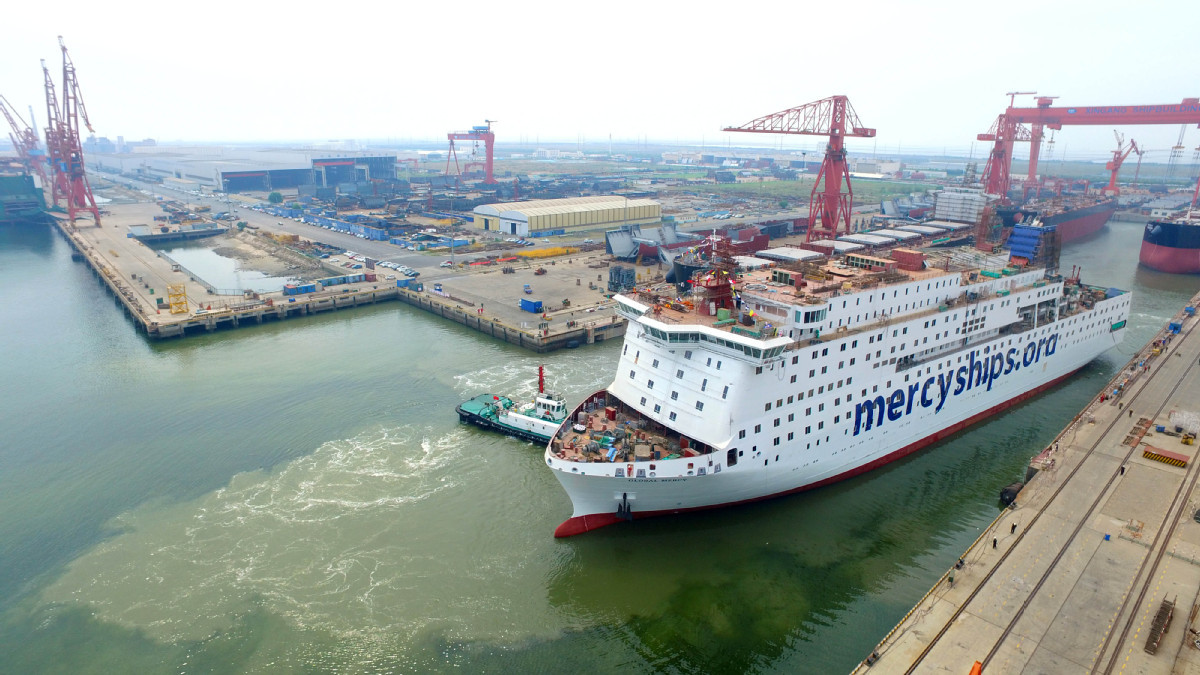More hospital ships needed for emergencies, adviser says


China should build more hospital ships so it can better respond to major medical emergencies, according to a national political adviser from the shipbuilding industry.
Dong Qiang, a member of the 13th National Committee of the Chinese People's Political Consultative Conference, and former chairman of China State Shipbuilding Corp, suggested that the government should set up special funds to design and build four types of hospital ships.
"We need hospital ships that can respectively be used along rivers, near coasts or in open seas far from the shore. They will be used for both civilian and military purposes," he told China Daily in an exclusive interview. "Such vessels will be specifically designed for medical purposes and have special ventilation and sterilization devices, as well as quarantine wards."
The largest type among the four models proposed by Dong would have a displacement of 30,000 metric tons and be tasked with serving long-range, ocean-bound operations. The ship would be capable of traveling more than 18,500 kilometers in a single voyage and operating without resupply for 30 days. It would have about 100 crew members and be able to support the work of more than 400 medical staff.
Such a ship could have as many as 1,000 beds for patients, including 600 that could be used for those with infectious respiratory diseases. There would also be intensive care units and 12 operating tables, according to Dong.
The second-largest model, as Dong described, would have a displacement of 16,000 tons and be capable of sailing for nearly 9,300 km and operating without resupply for 20 days. There would be 30 crew members and about 250 doctors and nurses on the vessel, able to treat 350 patients.
Preliminary technological research on these ships has started, and design work can begin at any time if the government approves the proposal, he said.
The political adviser explained the reasons for advocating the building of such hospital vessels.
"To deal with an epidemic or a natural disaster, the government will need to mobilize and organize a huge amount of medical resources very quickly to support severely affected places. One practical solution is a temporary hospital. But its construction requires a certain period of time and a very large input of manpower.
"In addition, if an epidemic overlaps with another contingency such as a natural disaster or war, it will be very difficult for the government to concentrate medical forces and resources within a short time," Dong said.
Therefore, a big country like China needs mobile forces for medical emergency response, he added.
Considering these factors, he explained, mobile medical facilities can be very useful, helpful and convenient as a supplement to the existing hospital system.
China has the world's first hospital ship designed and built for that purpose. CNS Daishandao, popularly known as the Peace Ark, is owned and run by the Chinese Navy. The ship, which has been known for its many overseas humanitarian missions, has 300 beds, eight operating tables and 2,400 items of medical apparatus such as computed tomography scanners, x-ray imagers and air purifiers.
The Peace Ark was developed and constructed by China State Shipbuilding Corp, the nation's leading shipbuilder and one of the world's biggest in this industry.
- Charting China's progress in 75 years (5)
- Hong Kong-Zhuhai-Macao Bridge receives over 20 million passengers this year
- Nation ramps up public services to meet rising cultural demand
- World Bank report ranks Hong Kong among top 10 global business hubs
- National Day holiday brings box office surge
- Hong Kong wins global acclaim as one of top places to do business





































